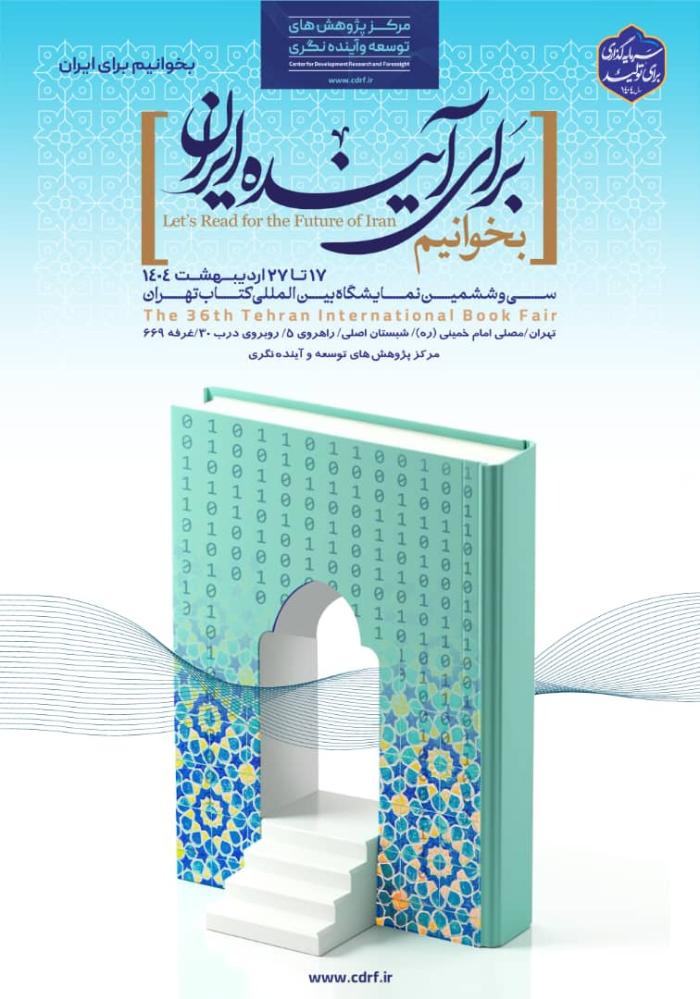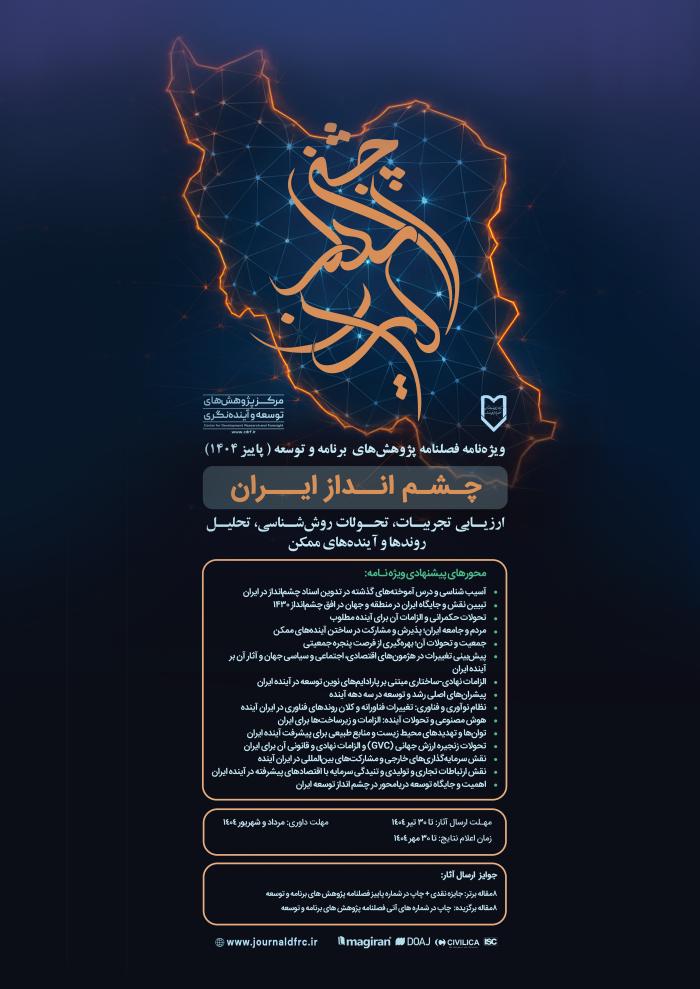


-
بررسی آییننامهها و دستورالعملهای برنامه هفتم پیشرفت
-
بررسی عوامل موثر بر افزایش تصادفات و تلفات جادهای و سوانح رانندگی و دادهکاوی تلفات انسانی
-
سازماندهی و بازآرایی فضایی آموزش عالی کشور
-
به روز رسانی سند ملی آمایش سرزمین
-
انجام مطالعات مناطق آزاد به عنوان نواحی پیشران اقتصادی کشور
-
اصلاح ساختار بودجه و پیاده سازی نظام یکپارچه مدیریت اطلاعات مالی دولت (IFMIS)

In the conference of “The Role of International Relations in Controlling Inflation and Production Growth”, it is stated that the main economic goals at the Ministry of Foreign Affairs are currency exchange and increasing employment. The embassies have a special mission to support and market the products of 640 domestic knowledge-based companies. Special attention is given to Iran's business opportunities with neighboring countries, Latin America, Southeast Asia, and especially Africa as a priority of the Ministry of Foreign Affairs in the thirteenth government. There is a high demand for Iran's medical and pharmaceutical products in Latin America.
In this conference of “The Role of International Relations in Controlling Inflation and Production Growth”, Dr. Seyed Mohammad Shafiee, the advisor to the President of the Center for Development and Foresight Research, began by expressing condolences for the days of “Arbaeen”. He then referred to the Supreme Leader’s remarks during a last meeting with the government.
Dr. Shafiee highlighted that on the anniversary of the martyrdom of Martyrs “Rajai” and “Bahonar”, and coinciding with Government Week, the Supreme Leader had discussed significant issues concerning international relations. These discussions took place during a meeting with the President and cabinet members, and are considered to be of substantial importance. He further elaborated that during this meeting, the Supreme Leader underscored the principle of diplomatic development aimed at economic growth and fostering relations with neighboring countries as well as others. The Supreme Leader also acknowledged Iran’s membership in two international agreements - BRICS and Shanghai - as significant accomplishments of the thirteenth government.
Dr. Shafiee, while referring to the Supreme Leader’s remarks at this conference, stated that the Supreme Leader emphasized on trade and export of Iranian goods, viewing trade as a pillar of production. The Supreme Leader also stressed on maintaining a trade balance, asserting that this approach should lead to an improvement in exports and capital inflows.
In continuation, Dr. Mehdi Safari, Deputy Minister of Economic Diplomacy at the Ministry of Foreign Affairs, started his speech at this conference. He outlined the Ministry’s policies in alignment with those of the thirteenth government, stating that developing relations with neighboring countries is a top priority for this government. Concurrently, efforts are being made to expand relations with Africa, Latin America, and East Asian countries. This senior diplomat highlighted that the primary objectives of the current foreign policies are to increase foreign exchange earnings and create jobs. He noted that trade with some neighboring countries had significantly declined in the past few years, from $6 billion to $120 million. Fortunately, this trend has now reversed, he stated. However, he emphasized that these figures are related to customs, and many trade relations, such as technical and engineering services, fall outside the customs framework.
The former ambassador to China stressed the need for production to be export-oriented. He stated that production should not only cater to domestic needs but also focus on exports. He added, efforts are being made to make certain export-oriented factories, which should not be influenced by domestic policies. For instance, the export of onions should not be hindered when there is a decrease in domestic supply. He emphasized the importance of adhering to commitments when a host country opens its market for our products.
The Deputy Minister of Economic Diplomacy at the Ministry of Foreign Affairs introduced three concepts: stabilization, growth, and creation of new markets. In response to the question of where the new market is, he pointed out the opportunities in Africa. He mentioned that many of our products, such as dairy products, fruits, and saffron, are not recognized as commercial goods by countries like China. However, last year our citrus fruits entered the Chinese market for the first time, attracting significant media attention in China. He added that markets like the shrimp market in China are very important. For example, some Latin American countries exported shrimp worth up to $8 billion to China last year.
In the continuation, the senior diplomat underscored the importance of exporting knowledge-based goods. He revealed that knowledge-based houses have been established as permanent exhibitions in target countries, with embassies tasked with marketing the products displayed in these houses. These houses are specifically designed for the export of knowledge-based goods.
Dr. Safari, while discussing the achievements of knowledge-based industries and new markets, stated that efforts are being made to earn foreign exchange through exports, diversify imports, and reduce import costs. Additionally, technology transfer and indigenization of certain products in the country are being pursued, he said. However, he noted that due to competitive monitoring, many achievements in self-sufficient technology transfer cannot be disclosed. He also touched upon the challenges of attracting foreign investment, revealing that at the 2023 exhibition held in the country, nearly 71 countries visited Iran, and an estimated $6.7 billion in investment was attracted. However, he emphasized that accurate statistics of these contracts should be obtained from the relevant officials and that all organizations should work together to ensure these figures continue to rise.
The senior diplomat from the Ministry of Foreign Affairs also discussed the topic of corridors. He expressed regret that the development of corridors had not been pursued in the past due to various reasons. However, he highlighted that attention has now been given to the completion of the Astara-Rasht railway and the development of shipping fleets in the Caspian Sea. He stressed that northern exports should not be confined only to southern regions via the Astara-Rasht railway line. He also mentioned the construction of new bridges on the Sarakhs route for vegetable exports and noted that there is currently a capacity of up to 15 million tons on these lines, which is double compared to before. Therefore, transit from north to south has been given attention by this government.
Finally, Dr. Safari discussed the importance of east-west transit and Iran’s exclusion from this trade route in recent years. He revealed that during the President’s recent trip to China, it was agreed to revive this route. However, he cautioned that achieving this agreement requires a uniform tariff and coordination among five countries, which necessitates significant effort. This issue is being seriously pursued, he stated. He also highlighted the Foreign Ministry’s collaborative efforts with other ministries. Dr. Safari stated that while they do not currently claim 30 million tons of north-south transit and 60 million tons of east-west transit, collective efforts are being made to achieve this significant goal. The projected revenue for these programs exceeds $100 billion. He, then, emphasized the importance of the Chabahar port for India, noting that in addition to Afghanistan, Central Asia is also of interest to India. Therefore, efforts are being made to activate the Chabahar port corridor. He pointed out that currently, trucks deliver goods from south to north faster than trains. In this regard, the Minister of Roads and Urban Development has issued orders to improve the process of rail obstacles. He added that short transit times and low costs are crucial in international transit. Extensive efforts have been made to remove existing obstacles to achieve this goal, he asserted. He also mentioned the importance of the Shalamcheh-Basra corridor. While this route has been defined as a passenger route, it can also be optimally used for commercial purposes, Dr. Safari stated. The connection to Lake Van is also important and will be pursued in future plans with Turkey. Additionally, he suggested considering electricity transfer and transit for neighboring countries.
The senior official underscored the importance of tourism as a source of foreign currency earnings. He stated that the issue of tourism, particularly health tourism, has always been a priority, requiring coordination between the Ministry of Cultural Heritage, Tourism and Handicrafts, the Ministry of Health, Treatment and Medical Education, and the Ministry of Foreign Affairs. He further added, with the expansion of Iran’s relations with countries in the southern Persian Gulf region in the field of pilgrimage tourism, developmental measures are expected to be taken. In this context, he posed a question about Iran’s capacity to accommodate 400 to 500 thousand Chinese tourists annually. He noted that Iranian and Chinese tourism companies are currently designing travel tours, highlighting the need for Iran to enhance its infrastructure. He also mentioned that Iran is currently hosting students studying medicine from India and other countries. Iranian pharmaceuticals and medical equipment, especially anti-cancer products and drugs, have garnered attention from various countries, particularly Latin American countries. He added that Iran has been successful in most tenders in the pharmaceutical and medical equipment sector.
The official also pointed out that Iran is currently active in seventeen to eighteen commercial development axes. He mentioned that investment in African mines is attracting interest from all countries, suggesting that Iran could also venture into this area. In this regard, he emphasized the importance of issuing technical and engineering services and making the most of various memoranda of understanding with different countries. He, then, criticized the country’s focus on finance, stating that finance should not replace Rial resources. He stressed the need for a change in approach towards finance, suggesting that it should not be viewed as compensation for shortages but rather as a means to generate finance.
In his concluding remarks, this senior official highlighted the numerous economic opportunities available in the international arena. He emphasized the need for competition and effort to reach these markets. He proposed the creation of commercial holdings and packaging in the supply of goods, stating that these holdings could innovate trade in various sectors of the country. He also suggested considering the establishment of joint industrial parks with neighboring countries and revealed that negotiations are underway to realize this idea.
In the end, Dr. Seyed Jafar Hosseini, head of regional development and planning affairs at the Plan and Budget Organization, spoke about the role of development policies in relation to international issues. He stated that efforts are being made to redefine the relationship between the Ministry of Foreign Affairs and the Planning and Budget Organization under the guidance of the head of the Plan and Budget Organization. This redefinition aims to make these relationships a source of income for the country. He assured that the organization is ready to support the realization of the Ministry of Foreign check check this text for Could you please review this text for any potential grammar issues? Affairs policies in economic matters to expedite the process of increasing the country’s income. Referring to the seventh program’s goal of having eight percent of the country’s population reside on the southern coasts, he stated that this population loading requires more attention, work, and development. He suggested joint action for forming regional chains, which would necessitate important measures. Additionally, he emphasized that connecting the railway line from Khash to Chabahar requires foreign investment, which should be given special attention.



